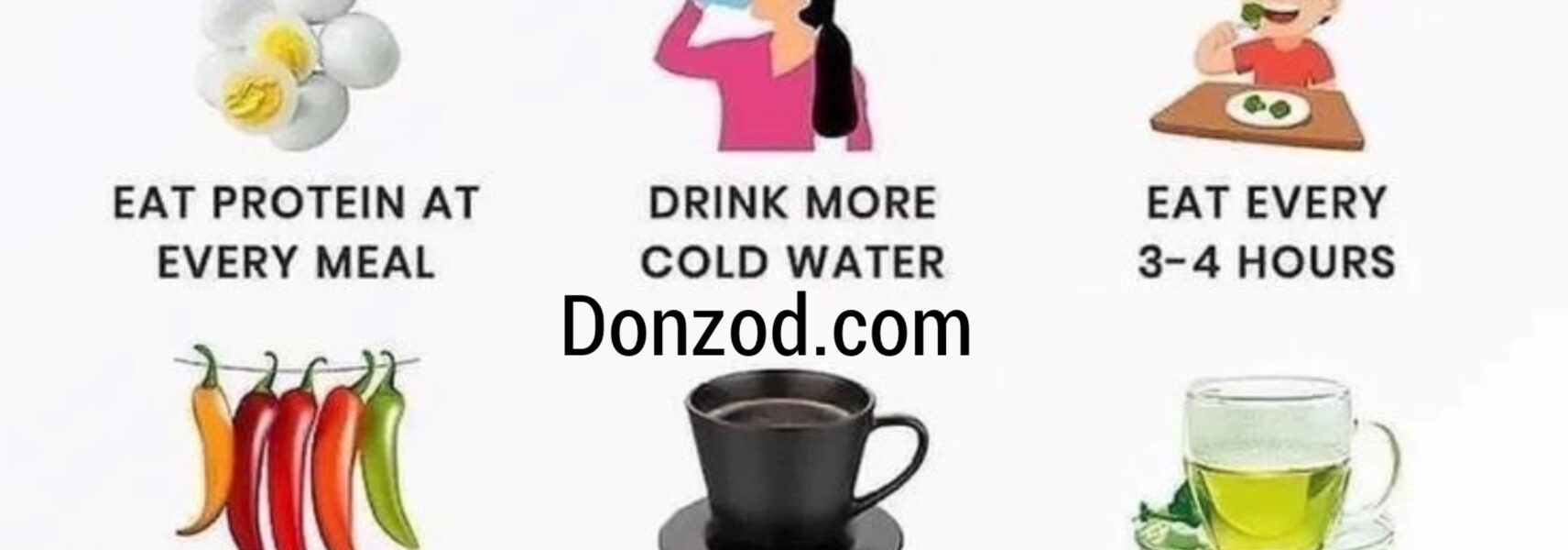Metabolism is the term that many people use without fully understanding what it really means. Some think it is just about weight loss, while some think it is only about digestion.
In this post, we are going to extensively discuss what metabolism is all about. metabolism is the process by which the body converts the food and drinks you take into energy.
It involves a chain of chemical reactions that keeps you alive and moving. The rate at which your body burns calories for energy is what is known as the metabolic rate.
There is often a struggle for people who feel like they have a slow metabolism. They eat less but still gain weight quickly.
On the other hand, there are people who seem to eat a lot without gaining any weight, and that is sometimes due to their metabolism being more active. Though genetics play a part in how fast or slow your metabolism is, there are still ways that you can naturally boost it.
In our website donzod.com, we will look at the best ways to boost your metabolism. These are simple and practical methods that almost anyone can adopt, whether young or old.
1. Engage in Strength Training
- Many people believe cardio exercises are the best for burning calories. That is true to an extent, but strength training has a unique advantage. When you build muscles, your body requires more energy to maintain those muscles, even while resting. This means you will keep burning calories long after you leave the gym.
- Lifting weights, doing push-ups, or working with resistance bands are effective examples. Some people avoid strength training because they fear becoming too bulky. But in reality, most ordinary people will not suddenly grow excessive muscles unless they train like professional athletes. Instead, the gain is lean muscles which supports a faster metabolism.
2. Eat Enough Protein
- Eating protein rich meals is one of the easiest ways to keep your metabolism working. Protein causes what is called the thermic effect of food. This simply means your body burns more energy when digesting protein compared to fats or carbohydrates.
- For example, after eating a plate of beans, eggs, or lean chicken, your body uses extra energy to break down the protein. This increases calorie burning in a natural way. Apart from boosting metabolism, protein also helps reduce hunger, because it keeps the body fuller for a longer period of time.
- However, people sometimes think more protein automatically means more benefits. That is not correct. Excessive protein without balance from other food groups may lead to other health issues. So it is better to combine proteins with vegetables, healthy fats, and whole grains.
3. Stay Hydrated
- Water is often ignored when people talk about metabolism. Yet, staying hydrated can significantly help your body burn calories more efficiently. Studies have shown that drinking water temporarily increases metabolism by about 10 to 30 percent for up to an hour.
- One simple habit is drinking a glass of water before meals. This not only helps with digestion but also supports your metabolism to function at its best.
- Some people replace water with sugary drinks, but that usually has the opposite effect. Sugary drinks add more calories to the body, while water adds none.
- Cold water is sometimes even more helpful because the body uses energy to warm it to body temperature.
4. Do High Intensity Interval Training
- High intensity interval training, also called HIIT, is a style of exercise that involves short bursts of intense activity followed by brief rests. For example, sprinting for 30 seconds and then walking slowly for one minute before sprinting again.
- The advantage of HIIT is that it keeps your metabolism elevated even after the workout is finished. This is sometimes called the afterburn effect. You continue burning calories long after leaving the track or gym.
- HIIT is not always easy, especially for beginners. But you do not have to start too intense. Short intervals of jogging and walking can already help. Over time, you can increase the pace and intensity.
5. Get Enough Sleep Helps Boost Metabolism
- Sleep is often underrated in discussions about metabolism. A lack of sleep can slow down the body’s ability to process glucose and regulate hunger hormones. This makes people feel hungrier and crave more sugary or fatty foods, which eventually reduces the metabolic balance.
- Aim for at least seven to eight hours of good sleep every night. Avoid staying awake with phones or laptops, because the light from these devices can disturb the natural sleep cycle. A good night rest allows your body to recover and your metabolism to work properly.
6. Manage Stress Levels
- Stress releases a hormone called cortisol. When cortisol levels stay high for a long time, it can lead to weight gain and a slow metabolism. Stress often makes people eat more junk food or skip physical activities, which also makes things worse.
- Relaxation methods such as meditation, deep breathing, or even just walking outdoors can reduce stress. When the mind is calm, the body regulates energy better, and metabolism improves naturally.
7. Avoid Skipping Meals
- Some people think skipping meals helps to lose weight. The truth is, skipping meals too often can slow down metabolism. When the body does not get food for a long time, it switches into energy-saving mode. That means it burns calories more slowly to conserve energy.
- Instead of missing meals, it is better to eat smaller balanced meals at regular intervals. This ensures the metabolism stays active throughout the day. A simple breakfast with oats and fruit can set a healthy pace for the morning.
8. Drink Green Tea or Coffee
- Green tea and coffee both have natural compounds that stimulate the metabolism. Green tea contains catechins, while coffee contains caffeine. These substances increase energy expenditure and fat burning for a few hours after consumption.
- Of course, moderation is important. Too much caffeine can cause anxiety, poor sleep, or increased heart rate. But one or two cups a day can be beneficial. For those who do not like coffee, green tea is a gentler alternative.
9. Stand Up More Often
- Modern lifestyle keeps many people sitting for long hours, either at the office or at home. Sitting too much can lower metabolic rate and increase the risk of health problems. Simply standing more often during the day can make a difference.
- For example, standing while talking on the phone, using a standing desk at work, or taking short walking breaks every hour. These small habits increase energy use and prevent metabolism from dropping.
10. Add Spices to Your Meals
- Spices like chili pepper contain capsaicin, a compound known to increase metabolism slightly. Though the effect is not immediate, when combined with other healthy habits, it contributes to overall improvement.
- Adding pepper to soups, stews, is a simple way to take advantage. However, people who cannot tolerate spicy food should not force it, because it might upset the stomach.
Conclusion on Boosting Metabolism
Boosting metabolism is not about one single magic solution. It is the combination of lifestyle choices that create the effect. Building muscles, eating protein, staying hydrated, exercising with intensity, and having proper sleep are all pieces of the same puzzle.
While genetics may give some people an advantage, everyone can still take steps to improve their own metabolism. The goal is not only about weight loss but also about maintaining energy, focus, and long term health.




